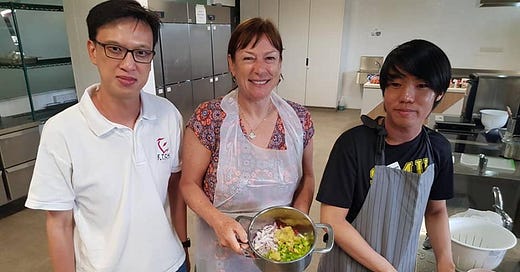Meet this group of exceptional cooks
“What surprises me is their level of enthusiasm and curiosity towards learning, and them freely sharing their knowledge and experiences,” says Aaron Yeoh of Fortitude Culina
If you heard the director of a culinary arts centre make this observation about their trainees, what would you think?
“Some of them have a heightened sense of smell and hearing, which aids them in becoming more efficient in the cooking process.”
Interesting, huh? You’d probably say the trainees sound very competent and even superhuman. Maybe you’d expect their dishes to be nicely done and full of flavour.
Well, you’re likely right.
The above quote was made by Aaron Yeoh, the director and project manager of Fortitude Culina. What makes his statement even more special is that their trainees are visually impaired.
Fortitude Culina is a social enterprise and non-profit group that offers cooking classes to the visually impaired, helping them to master culinary skills, navigate the ins and outs of a kitchen, and in the process become confident, knowledgeable and independent.
He’s joined by Olenka Lim, director and curriculum and community developer, and Ernawati, chief trainer.
There’s more.
“What surprises me is their level of enthusiasm and curiosity towards learning, and them freely sharing their knowledge and experiences,” says Aaron.
“Despite their vision loss, they still have a vision in life.”
A well-rounded kitchen
Part of Fortitude Culina’s success can be attributed to Ernawati, who’s visually impaired. Aside from being the chief trainer, she also co-designs their culinary training curriculum.
“The beauty of this project is that we managed to find talent within the visually impaired community to lead the cooking class. This is the thing that stands out the most,” Aaron explains.
“Having a visually impaired trainer allows us to quickly build trust with our visually impaired trainees, and have a conducive environment for collective learning.”
It also makes for a fun and unique cooking class. If you love to cook, you’d do well to use Fortitude Culina’s visually impaired trainees as inspiration and have the following elements in your kitchen. They’ll help you rethink your own methods, give you a different perspective, and convince you to not take anything for granted.
#1 A talking induction hob
If you could, take advantage of the technology that’s available – or look at your kitchen gadgets and maximise their use. There might be features and functions that you haven’t tried yet.
“We don’t have favourite tools, but the talking induction hob is the most important,” Aaron points out.
“The visually impaired need cooking equipment that has audio feedback so that they can leverage on their hearing to know the temperature and time.”
#2 The specifics
There are times when clear and concise measurements will provide you with the best results. Why not carefully consider your ingredients and recipe first before you begin?
“Besides talking kitchen equipment, the visually impaired also need the recipe to be more detailed,” Aaron states.
“For example, the duration for boiling pasta – or what exactly does a pinch of salt mean?”
#3 The awareness to stop, look and listen
We may rely a lot (or even purely) on taste and sight, but it also helps to use your sense of smell, hearing and touch. You’ll be pleasantly surprised.
“One of our favourites is cooking pasta, as we use herbs and fresh ingredients,” Aaron shares.
So what’s a visually impaired cook like in action? Find out when you sign up for Fortitude Culina’s Social Experience programmes.
They include The Blind Café and What’s In The Box?, where the public and Fortitude Culina’s visually impaired friends can interact and bond over good food and music.
For more on Fortitude Culina and how you can help, follow them on Facebook and Instagram.






